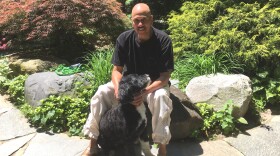Editor's Note: this story originally aired on March 4, 2018. From now until April 30, you're invited to experience the life of Dr. Martin Luther King, Jr. A new art exhibit in East Lansing will display King’s emergence as a civil rights leader, his assassination and his legacy after death.
WKAR’s Reginald Hardwick talked with the exhibit’s organizers about why King’s message is still relevant in 2018.
Transcription:
Hardwick: This Sunday, art work and artifacts about Dr. Martin Luther King, Jr. will be on display at the East Lansing Hannah Community Center. And joining me now to talk about that is Elaine Hardy chairperson of the Greater Dr. Martin Luther King, Jr. Holiday Commission.
Hardy: Thank you so much, Reginald, I’m happy to be here.
Hardwick: Elaine, tell me about some of the objects we will see.
Hardy: What we have on exhibit are some artistic interpretations of prints that are of the civil rights movement. So, you’ll see images from Selma, you’ll see images from Birmingham, you’ll see images from Montgomery, you’ll see images from Atlanta. And what we’re hoping to do is tell the story of Martin with those images in a chronological order from the time he emerged on the scene as the civil rights leader through his assassination and up until his birthday was recognized as a national holiday.
Remembering Martin: East Lansing Hannah Community Ctr. Hours: Mon-Fri 6AM-6PM, Sat 8AM-6PM, Sun 1PM-6PM
Hardwick: Where did the collection come from?
Hardy: They are all part of personal effects from commission members and some of them are prints that we have received from the National Archives – copies of those, but they are primarily, privately owned by some of the commissioners. Four years ago, I had the honor of working with a graphic designer to reproduce some prints from the Selma march when Congressman John Lewis was in that area speaking. And these particular prints are special to me because when Congressman Lewis saw them, he became emotional. He actually signed the prints for us. But I think all of the images that you’ll see in the exhibit will evoke a personal feeling from everyone who is able to view them.
Hardwick: So, this exhibit opens Sunday and you did not plan for what will happen here in East Lansing on Monday with Richard Spencer speaking at MSU. But will people be able to see it on Monday if they want to have an alternate activity?
Hardy: The exhibit opens on Sunday, but it will run through April 30th so people will have an opportunity to view the exhibit on Sunday, on Monday. The art gallery is open Monday through Friday from 6 a.m. to 6 p.m.
Hardwick: Why is it important to share these images and Dr. King’s message at this time in 2018?
Hardy: I think that his message is relevant for us. One of the things that I always tell my children and anyone I have the opportunity to is that he had a tremendous audacity in him to believe in the credo of this country to say listen, we are all Americans, we all are equal. And he didn’t live in a time where that was the truth. He couldn’t get on a bus anywhere he wanted to, he couldn’t eat anywhere he wanted to, he couldn’t go to school anywhere he wanted to. And for him to have the audacity to believe that and bring a whole nation along with him and then bring a whole world along with him, his message is relevant today. We see renewed challenges to voting rights, we see a climate in this county that is not as inclusive as it could be. But one of the things about Dr. King and his message, it always embodied hope and the belief that America is the America that it says it is. And, Reginald, I have to tell you, when I was born, there was no provision in the United States’ Constitution that protected my right to vote. And I had in my lifetime the opportunity to vote for an African American president and a woman president. I believe in that America that Dr. King believed in. I know that tomorrow might be hard for some of us. I know that we are looking at renewed challenges, but I believe that there is a better day. And I know that because I know Americans, I know my neighbors, and I know that we will always search to be a good place for everyone. I know that we will always search in ourselves for our better angels, and I know that we believe in the higher ideals of our country. And so when I think about Dr. King and the relevance of his message of social justice and inclusion and making certain that everyone is counted. I know that it is relevant for everyone today and I still believe in that America and I still believe in his dream.
Hardwick: Well thank you Elaine Hardy, chairperson of the Greater Dr. Martin Luther King, Jr. Holiday Commission, for joining us.
Hardy: Thank you.











